Guinea hens and guinea fowl can best be described as loud, annoying, loud, and dumb. Despite these very apparent shortcomings, they can serve a critical role on your farm or homestead.
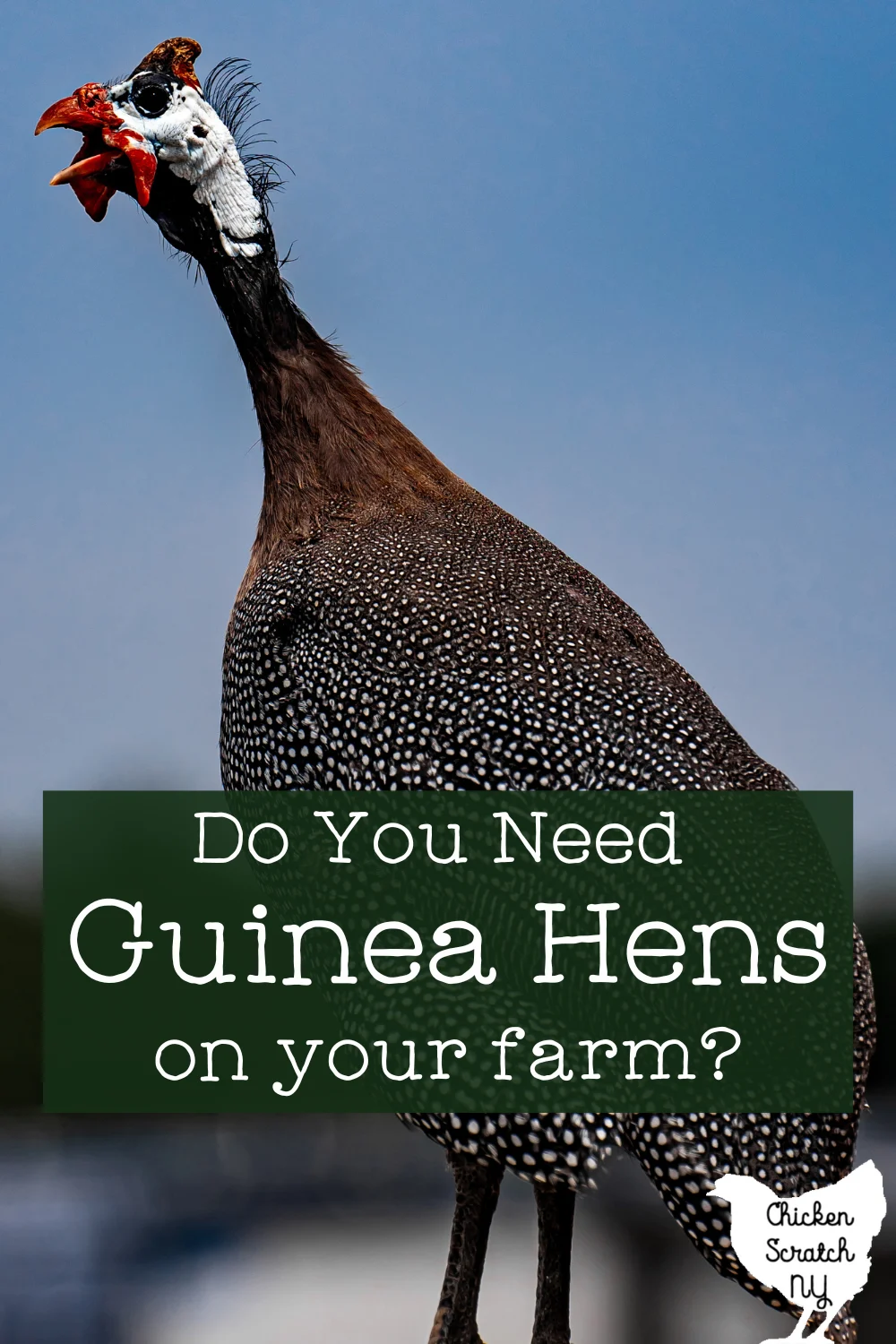
Guinea fowl come from Africa (they make an appearance in the Serval episode of Wild Krats) and out of all the birds commonly kept on farms, they are the least domesticated and have the most feral nature. One of the most common issues people have with keeping Guineas is literally keeping them around, but we’ll get to that in a moment.
I’ve had guinea hens on and off for over 10 years, everywhere from zero to 22 when mine decided to become parents. For the record, 22 is about 17 too many and I do not recommend it.
I have found myself wobbling between finding them a useful addition to my flock and daydreaming about roasting them. It’s a “dose makes the poison” situation, when you only have a few the good outweighs the bad, but when you have too many you’ll find yourself daydreaming of a rotisserie.
Guinea Fowl Appearance
Imagine an angry (possibly drunk) clown wearing a beautiful polka-dotted dress, now make that clown a bird and you have a guinea hen. They have the ugliest faces and the prettiest feathers.
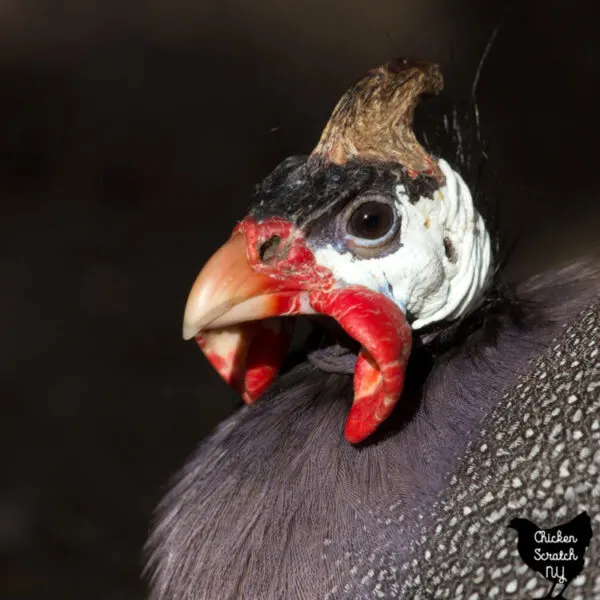
When you see them up close they have a very white face with a black patch between the eyes, red wattles that hang in a C shape from the sides of the beak, and of course a horn. Why wouldn’t a barnyard devil have a horn?
They have thick bodies with a shape somewhere between a football and a watermelon. They’re also easy to identify by silhouette because their heads look way too small for their bodies.
The standard color is Pearl Grey which is a dark grey with small white dots. When you look at the birds screeching and zipping all over the yard it’s easy to miss the polka dots but when you find a feather it’s pretty obvious who it came from.
There are also available in lavender (pale blue-grey with white spots), purple (deep purple with white spots), and solid white guineas available. Cackle Hatchery also offers a French Pearl Guinea that is heavier and better for meat production.
That’s right, people eat these evil clowns. All jokes aside they’re edible and some people consider them a delicacy.
Unlike chicken from the supermarket, guinea fowl have flavor. Some people call it gamey and it’s often compared to pheasant.
This recipe for Rosemary Brinded Guinea Hen starts with 10 cloves of garlic and only gets better from there. I might even print off a copy to hang up in the barn as a threat to my remaining birds to stay in line.
Adult guineas weigh in around 3-4 pounds for females and 4-5 pounds for males. Unlike with chickens and turkeys, there really isn’t much size variation based on gender.
Read more about Heritage Turkey Breeds vs Broad Breasted Turkeys
The best way to tell male guinea cocks from female guinea hens is by their call. And you’ll have lots of opportunities to assess because they never shut up.
Guineas make two distinct sounds, both male and female guineas make a “chi chi chi” call. It’s a very short, single-syllable call and you’ll hear it a lot.
The chi chi call is their warning or alert call. Unfortunately, they might as well change “the boy who called to wolf” to the “guinea that called chi chi chi” because they will alert for any and everything.
The other call is only made by females, it’s a two-syllable call and sounds like “buck-wheat” or “buh-qweet” where the first half is lower and the second is high-pitched.
If you hear this call you have a female. You’ll also know if you find eggs or if they wander out of the woods with a dozen tiny babies behind them.
Read more about How to Tell Roosters from Hens
Caring for Guinea Keets
There are a few pitfalls to keeping guineas and they start right from the beginning. Guinea keets are tiny.
Fortunately, they lack the demon quality of the adults and they are pretty cute.
Their small size does cause a few issues, the first is actually with shipping. The babies are very small and most hatcheries will limit shipping to warmer months and larger quantities.
I briefly touched on it earlier but I’m going to warn you, 15 guineas is too many unless you have massive acreage.
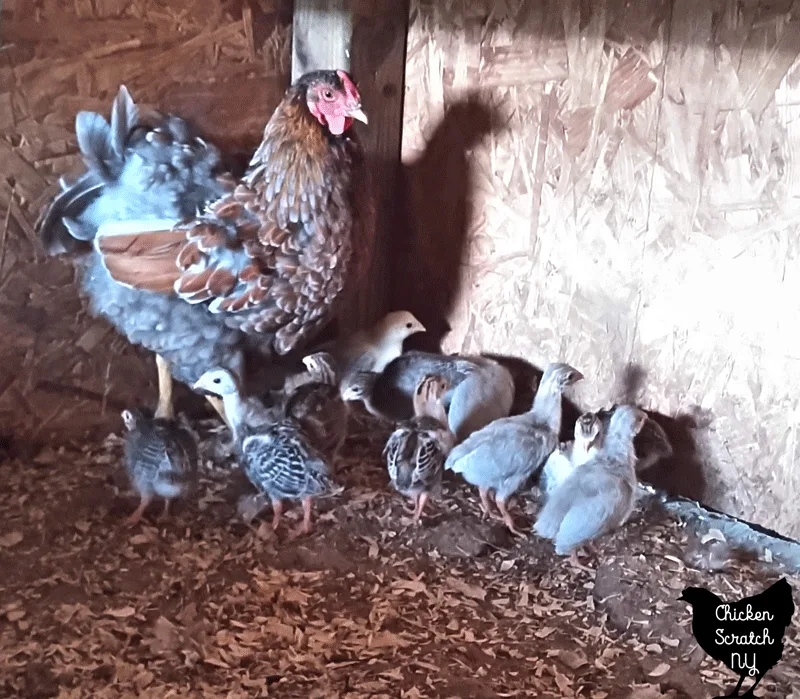
Once you get over the bar of getting your guinea keets the problems don’t stop. People like to say turkeys are dumb but really the prize goes to guineas.
Read more about Raising Turkeys
The tiny puffs are notorious for drowning in their waterers, even if they manage to get out of the water they might get chilled and still die.
In order to prevent drowning and soaking it’s a common practice to place marbles in the waterer. The keets can still drink but they can’t drown.
As for food, guinea keets should be fed a high protein starter. It can be harder to find than a standard chick starter and the options are a lot more limited.
I’ve always used the Purina Gamebird starter which is available at Tractor Supply, if it’s not available near you Chewy carries Kruse’s Gamebird feed. If you’re not familiar with Chewy, they focus mostly on house pets but they have been offering more farm options lately.
Due to their small size, proper heating and protection from drafts is even more important with keets than with chicks. I like to use plate brooder with keets, due to the shipping limitations I’m usually raising them later in the year so the ambient room temperature isn’t a problem.
My favorite way to raise keets is under a chicken. I’m all about making life easier and if you have a good mama hen who happens to be broody, give her a shot with the keets.
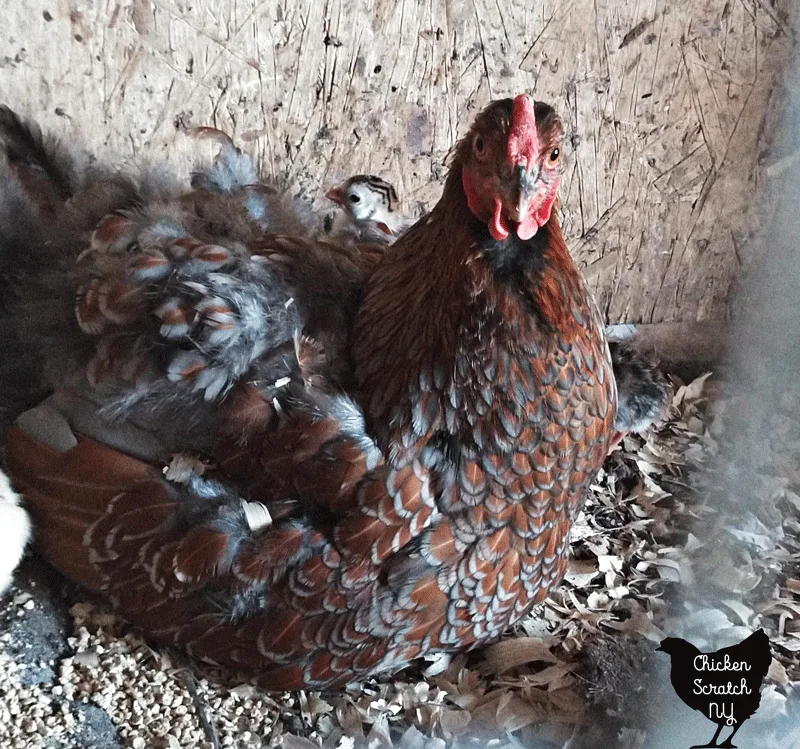
Sneak them in at night and cross your fingers*. The last time I had keets I immediately handed them off to a blue-laced red Wyandotte hen and she did a phenomenal job raising them.
*There is more to it than this! Don’t just chuck the keets in and walk away!
They still turned into a-holes but I think being raised by a mom with a functioning brain made them marginally more intelligent.
The Struggles of Keeping Adult Guineas
Once you’ve managed to get the tiny idiots to adulthood you can take a moment to pat yourself on the back, but don’t take too long because the struggles continue!
Out of all the birds I’ve raised (chickens, geese, ducks, turkeys & guineas) Guineas are the hardest to keep in the barn at night.
I have my coop set up with a variety of roosts, including some that are over 6 feet off the ground and I think that’s the only thing that gets them in at night.

Even with high roosts they occasionally go through phases where they really want to sleep in the trees outside the barn. Somehow it always corresponds with an ice storm.
Their favorite tree fell over last summer so hopefully, they’ll spend future icy blizzards in the barn where they’re safe.
Getting your guineas to sleep in the barn is even harder if you start with adult birds. Your best bet is to lock them in the barn or coop for at least 3 days but longer is better.
Make sure they have access to food and water and with a little luck, they learn where they’re supposed to be.
I’ve never had much success getting my guineas to lay regularly in the barn, they seem to hate the nest boxes and while I’ll occasionally find an egg on the floor they prefer to make nests in the garden (my asparagus bed seems to be a big hit) or out in a field somewhere.
Another issue you may have with keeping guineas is their aggression. While it has its own benefits it can make things like feeding your mixed flock really tricky.
I’ve seen my guineas body check my full-grown tom turkeys and adult geese to get them away from food. Because of this, I’ve adopted a widespread scatter method for feeding instead of using bowls.
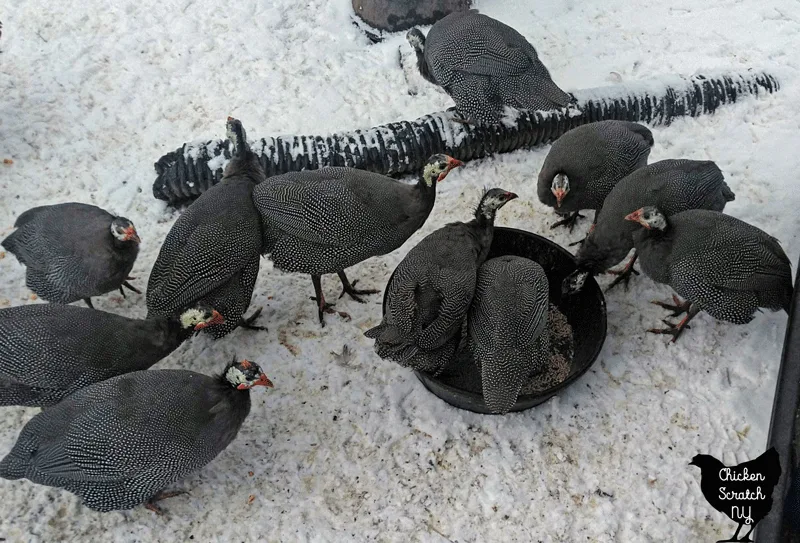
Feeding on the ground isn’t the best plan from a disease perspective but it does allow me to make sure all of my birds are given a chance to eat and not just the demon clowns.
A big part of the obnoxiousness of guinea fowl comes from their curiosity. They will notice anything different and they will loudly announce it to the world.
I can not stress enough how freaking LOUD guineas are. Everything sets them off and they really only have one volume, which is somewhere between the Warp Tour and a rocket leaving the atmosphere.
They’re loudest when they get separated from each other. My house is set up with doors to the front and back yards directly across from each other and during the summer when they’re open I’ll often have guineas at both doors yelling back and forth through the house to each other.
It’s… fun.
If you’re thinking you can avoid listening to Satan’s feathered friends by fencing them in you’re wrong. They regularly fly over my house and view fences as a mild inconvenience to freedom.
It is worth noting that the 3-foot fence that keeps my geese out of the road is apparently adequate to keep the guineas from getting back to the barn and I regularly have to open the gate to allow them back into the barnyard. I’m telling you, they make turkeys look like geniuses.
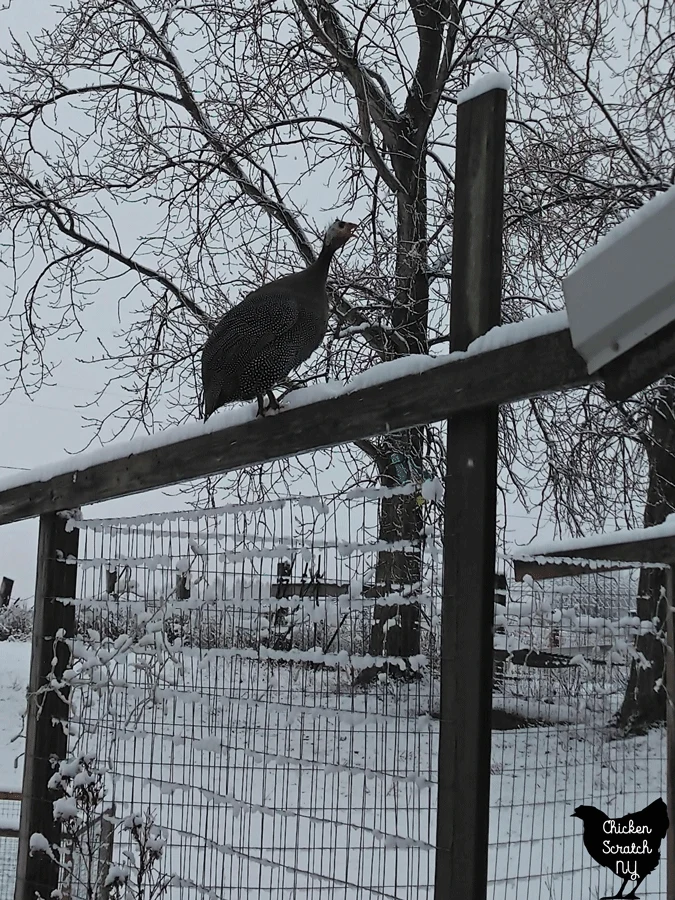
The final thing on this really fun list is a quote from my large animal vet, it does give you a hint to their usefulness but also the biggest struggle in keeping them:
Guineas are good at two things, eating ticks and dying
-large animal vet
Honestly, the hardest thing about keeping guineas is literally keeping them alive. They do dumb things all the time.
Like sleeping in a tree during an ice storm, trying to eat the lines on the road, or squaring up with a fox for funsies.
To sum things up:
- they won’t willingly sleep in the barn
- they’ll hide their eggs
- they’ll pick on your other birds
- they’ll laugh at your fences
- they’re constantly fighting for a Darwin Award
The Benefits of Keeping Guinea Hens
As we’ve gone through this hopefully entertaining journey/therapy session you may be wondering why in the name of all things holy I still keep guineas.
The very simple answer is they eat ticks.
I live in the North East, we have ticks and Lyme disease everywhere. Everywhere except my backyard.
The last time I was guinea-less my soulmate/golden retriever Alfie ended up with Lyme disease. He was ok after a course of antibiotics but I decided that evil clown birds were a better option than picking ticks off my kids and pets.
Since having the guineas I haven’t seen a single tick on myself, my kids, or my dog.
Unlike the other birds on my farm guineas are primarily interested in eating bugs. I have my garden fenced off from the chickens (I occasionally like to eat the tomatoes I grow sans beak marks) and when the guinea fowl get in the garden they don’t dig or cause the problems the other birds do.
Which is great because the 4-foot fence is nothing to them and I couldn’t keep them out of my garden if I wanted to.
On the off chance that ticks don’t bother you, what about snakes?
My property is on the wet side and when I moved in 10+ years ago there were a lot of snakes. They didn’t bother me at all because I like creepy things and living in central NY we don’t have venomous snakes.
We had mostly garter snakes but once I saw a hognose, it was adorable and I loved every moment of it.
Long story short, we don’t have snakes anymore. I can count on one hand the number of snakes I’ve seen in the last 5 years.
Guineas are very interested in everything around them, and since their only mode is anger, they’ll throw down with just about anything.
Sometimes that means eating a snake, sometimes it means attacking a fox. They don’t always win against the foxes but you have to admire their will for destruction.
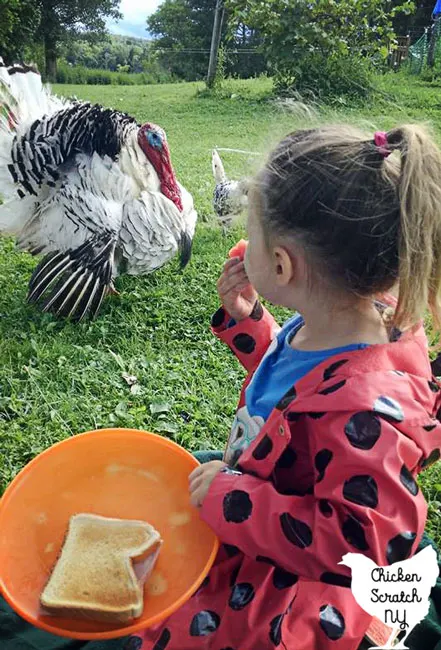
Let’s finish things up with an anecdote, one of my favorite ‘am I seeing this’ moments on the farm involved my beloved late turkey Gobbles and the two guineas that adopted him into their clique.
We have a large population of wild turkeys around us and one day I noticed Gobbles had called in a wild tom. He was getting up there in age and I don’t think he would have won that fight.
I was about to go out and defend him when out of nowhere the two guineas darted out of the weeds and body-slammed the wild turkey.
It was a SET UP. They used their lovely turkey friend to lure in a wild animal to bully.
If only they could use their powers for good.
Have you ever kept guinea fowl? If not, I’d love to know if I have talked you into or out of your own flock of evil clown birds.
Check out my Livestock page for more info or start here:


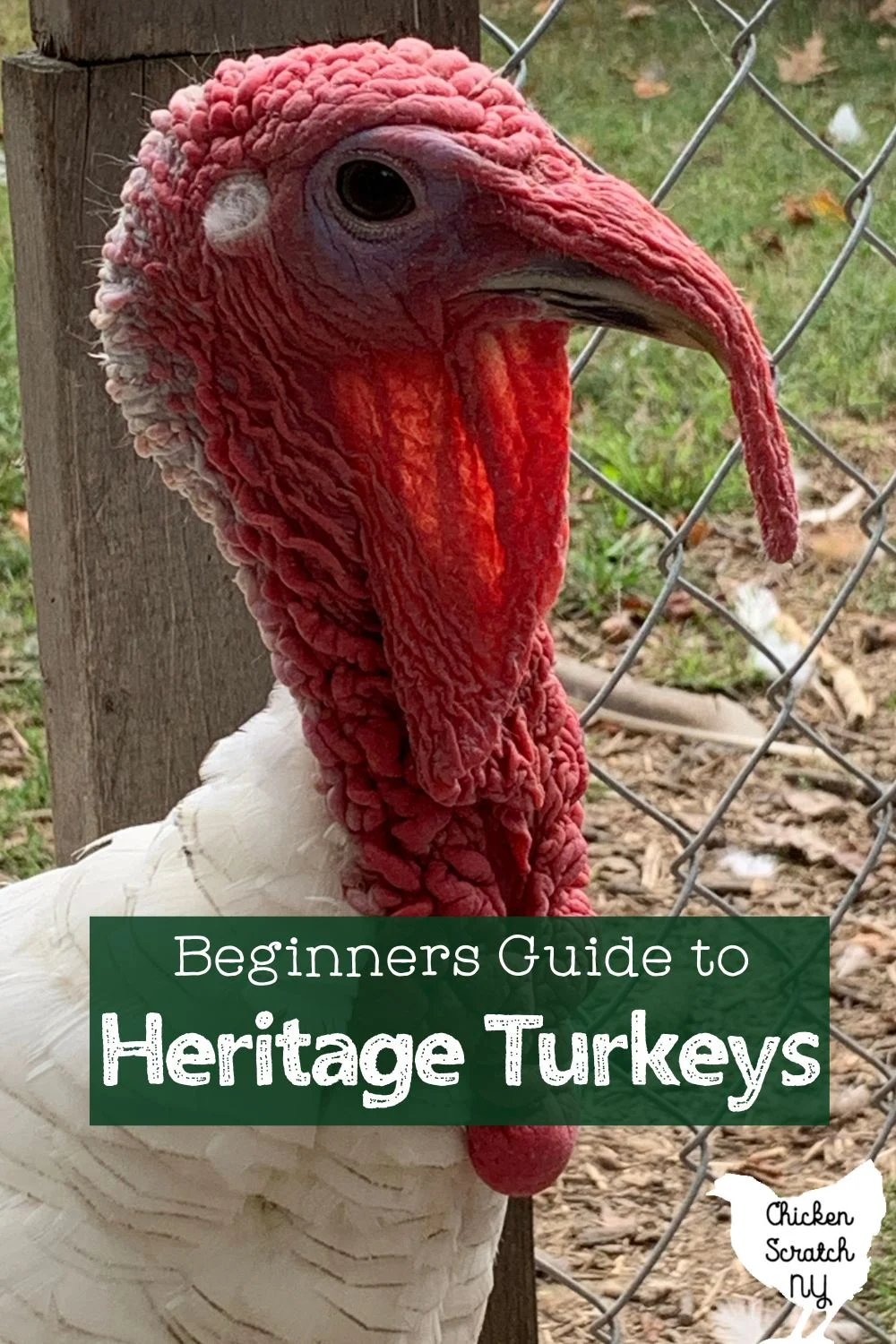
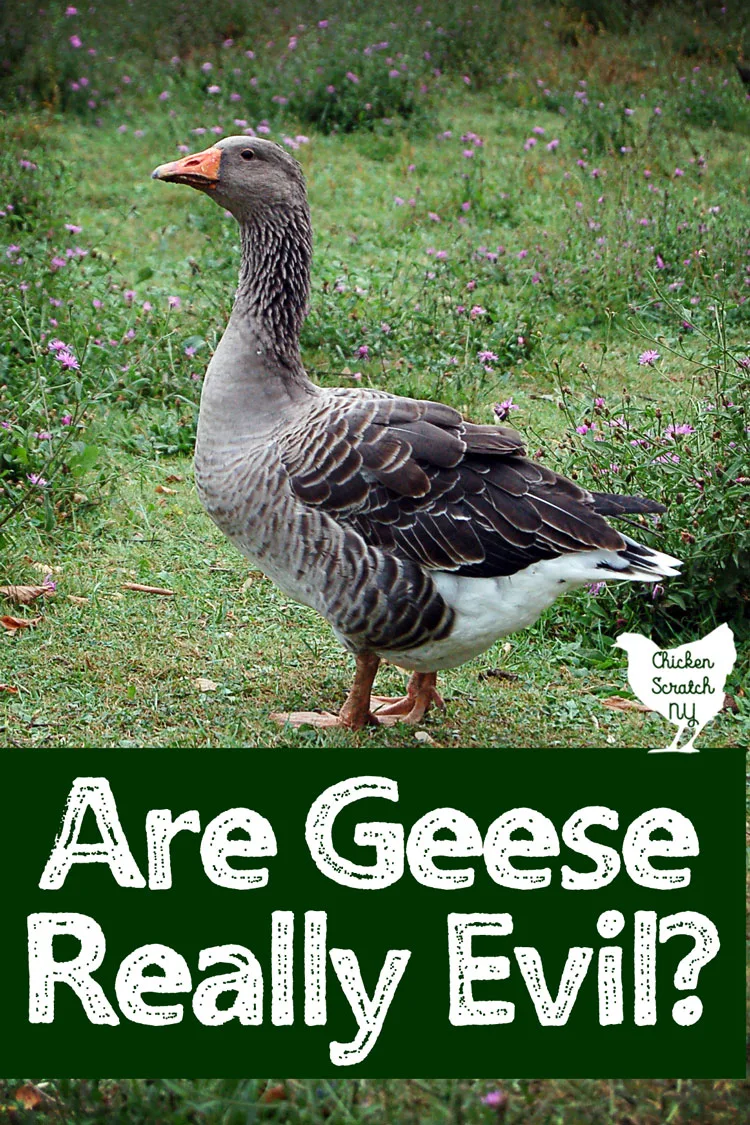
Denise
Monday 15th of April 2024
My neighbor had a flock of guineas. They always came to my property. I didn't mind unless they died on my property. I had a small pond with feeder gold fish that grew big and beautiful. I always found them drowned in the pond. It was hard to notify the neighbor of a drowned bird. The best story I have is a bucket I left out. Well it rained and there was about .5 inch of water. It went in head 1st into the bucket and we had to fish it out of the bucket because the bird was drowning itself. We turned around to walk away and the bird nose dove back into the bucket and started drowning again! We fish the bird out about 3x and had to turn the bucket upside down so they didn't drown itself. Your they are dumb! Everyday they would show up at day break and a flock of them would stand outside my window and do thier call. You can't sleep it at all.
Saturday 29th of June 2024
@Denise, That is funny! My dad raised guineas and I remember he always said they were DUMB.
Ousayd
Saturday 13th of April 2024
you forgot to add, all they do is sit and yell at their reflection of your cars, sit on your doorstep and sh#t everywhere and chase other animals
Alecia
Thursday 25th of April 2024
They really are obnoxious
Nimaro
Saturday 9th of March 2024
Where should I get Guinea fowl?
Alecia
Thursday 21st of March 2024
Most mail order hatcheries sell them, they usually have a shorter window of availability due to their small size and more delicate nature
Kelly
Monday 4th of March 2024
I laugh. You have made this story so funny. I’m curios I was reading and they say they’ll kill your chickens. Do you keep the guineas and chickens in one coop? I would love to have them to clean up my yard full of ticks too, but how many do you need in order to notice the difference? I will definitely have to think about this one though. Thanks for sharing such a great story. I needed some good laughs!
Alecia
Thursday 7th of March 2024
I currently have 3 and that's more than enough for my 5 acres (not that they respect boundaries) and my patience. I've never had a guinea kill a chicken, they do get pushy, especially around feeding time and they'll pull feathers out of the turkeys when they invade their space.
I don't think you'll have a problem as long as you have space for them, I wouldn't recommend trying to keep them in a run I could see how that would cause issues.
I have a small barn where all of my chickens, geese, turkeys, ducks and guineas spend nights together but during the day they're free ranged
Ligia Williams
Saturday 27th of January 2024
Thank you for the information on guineas. I've never seen one and one day one came in my yard and she has been here for three days. I did not know what it was and I've been asking on Facebook if they know who it belongs to. I have not heard from anyone. I live in a community and I only have one chicken. I don't know what to do with it.I am an animal lover -I have three chihuahuas and a Maltese and they scare the Guinea but she won't leave and I've been feeding her. My dogs don't like her.